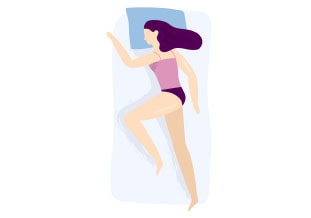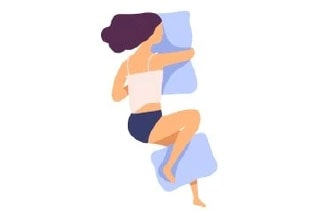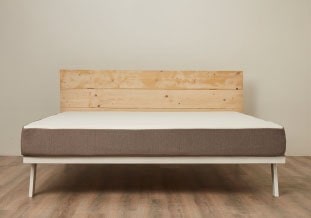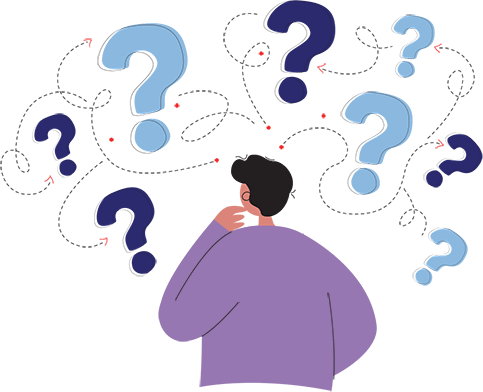

Which Side Is Best To Sleep?
10 Best Sleeping Positions
For Optimum Health
Last updated on July 21, 2022
Sleep is as significant for health as food and water. You wouldn’t skip eating the entire day because if you did, your body would take a serious hit. But many people tend to make compromises on the vital 8-hour activity.
These regular compromises accumulate over time and cause risky health issues. A balanced diet and consistent workout are futile if you don’t get enough sleep.
For the best sleep quality, it is important to consider factors such as habits before sleep such as which side is best to sleep, timing, duration of sleep, etc. After you’ve scrutinized these aspects and made positive changes, you can enjoy a restful and healthy sleep.
Sleep Statistics
Until 2019, India was the second most sleep-deprived nation as mentioned in the Times of India. Over the last couple of years, India has remained in these top rankings along with Japan, South Korea, and Saudi Arabia.
Reasons for sleep deprivation in these countries:

The COVID-19 pandemic played a major role in sleep deprivation across the globe.

Hectic work-from-home schedules, binge-watching shows or movies, and mental health/stress-related issues have also contributed to improper sleep schedules.

Ignoring things like which side is best to sleep, eating habits before sleep, or ideal room temperature can lead to disturbed slumber.
The Effects of Sleep Deprivation
A machine needs fuel (food) to run but without regular rest (sleep), a breakdown is inevitable. The body experiences self-repair and strengthening during sleep so inadequate amounts could lead to undesirable after-effects.










Although sleeping involves doing almost nothing, except deciding which side is best to sleep, it isn’t always easy. If you’re someone who can doze off in two seconds, you’re lucky. Many struggle with the process of falling asleep, having a decent amount of shut-eye, and enjoying the rejuvenating activity.
It’s not unlikely that you’ve wished your body had a standby button at least once in your life because of disturbed sleep. Certain mild cases can be solved with simple precautions but continuous sleeplessness or sleep deprivation requires medical attention.
The Benefits of Sleeping Well
Knowing the benefits of a good night’s sleep will help you see the activity differently and, therefore, put more effort into maintaining healthy sleeping hours. Here are the top reasons you should never skip out on your zzzs:




When your bed pleads guilty of your sleepless nights, just get a better one!
Sleep Cycle- An Overview
A sleep cycle is a consistently occurring brain wave pattern that goes on for 90 mins to two hours. An individual usually experiences about five to six sleep cycles during his/her slumber. Each sleep cycle includes four stages – Non-REM (3 stages) and REM. REM stands for rapid eye movement.
The body moves to a state of sleep starting with the non-REM stage. The following are the occurrences in the sleep cycle.
Non-REM Sleep:
REM Sleep:
Importance of Sleeping a Full Rem Cycle
REM is a vital stage for overall well-being. Right measures to prepare your body for good REM sleep include determining which side is the best to sleep on, what temperature is appropriate, and what kind of bedding works for you.
Why do you need your REM sleep?
What Indicates That You Have Slept Well
If you don’t take more than 30 minutes to fall asleep, then you are in the green zone. Anything above that indicates low-quality sleep.
Having continuous sleep with the least number of interruptions is more beneficial for your body health than irregular sleep. A good night’s sleep will keep you rested and undisturbed for the entire duration. Knowing which side is best to sleep can help reduce disturbances.
Any healthy adult requires 7 to 9 hours of sleep every day. Getting fewer than 7 hours of sleep will not allow you to experience all stages of sleep, leaving you unsatisfied and grumpy. Also there are a lot of benefits of sleeping 9 hours every night. If you wake up happy and relaxed, there is a good chance you enjoyed high-quality sleep.
Good sleep has a domino effect. If you had a healthy sleep the previous night, then it is highly likely that you’ll experience it again the next day.
Indicators of Bad Sleep
Low-quality sleep has short-term and long-term indicators.
Good Sleep 101: Replace your old, worn-out mattress.
What Are Sleeping Positions?
Do you end up sleeping on your back right through the night? Or are you a person who shifts between six different sleep positions during your sleep cycle? You can consider the position you find most comfortable and often resort to during sleep as your sleep position.
Everyone has their preferred sleep position and they aren’t based on any clear factors. Comfort usually is the most predominant basis for choosing which side is best to sleep. No matter what other factors change in your sleep cycle, your sleeping position usually remains unchanged. And so does your mattress as they lack an ergonomic design to them.
Your current sleep position could be perfectly suited for your needs or you could require a better position for any pre-existing condition. There is no correct sleeping position as each position has its own pros and cons.
Lying on the stomach could be beneficial to reduce snoring and breathing issues but might do more damage than good for someone with back problems. Choosing the best side to sleep depends on your personal needs rather than an overall outlook.
Why Does Your Sleeping Position Matter
In your younger years, sleeping positions might not be a deal-breaker for good quality sleep. You didn’t have to ask yourself which side is best to sleep. You could sleep on your back, stomach, or side and face no after-effects. But as you advance in your years, there is an accumulated increase in health issues, especially those that affect your daily activities. Your sleep position affects your health and wellbeing.
As various aches arise in the neck, back, and limbs, it is important to find healthy sleeping positions that do not aggravate any existing issues. It might be hard to shift from a comfortable position to one that benefits your overall health, but it is definitely worth the effort.
You end up spending one-third of your life in this position, so make sure you know which side is best to sleep. But sometimes it’s the room’s ambience that annoys you unknowingly. In this case, giving a complete bedroom makeover will smoothen things out!
Identifying Your Sleeping Position
Although you probably alternate between two or more positions through the night, there is one position you spend the majority of your life in. You might not be able to immediately identify your preferred sleeping position but after a week of analyzing yourself, you will get a rough idea.
The position that you most often begin sleeping in and wake up in is your sleeping position. This can vary mildly, that’s why it is best to observe yourself over a few days. Once you determine your sleep position, you can decide which side is best to sleep.
What Happens if You Sleep in The Wrong Position
It would be the wrong position for you if it did not benefit your situation and only made things worse. If you slept in the wrong position, there is a high chance of you facing back and neck pains due to uncomfortable sleep.
If you are already a victim of these aches, then it is important to find the correct sleeping position for you. Not just for you, also make sure your children experience optimal sleep everyday. You can look at kids bedroom ideas to make the space more conducive to sleep.
A wrong sleeping position such as sleeping on your back could hinder the airways of your lungs and lead to obstructive sleep apnea. It is a serious issue that causes difficulty in breathing and disturbed sleep. You should determine sleeping on which side is better and make the necessary change.
You get optimal sleep due to a lot of factors. Your sleeping position, your night-time routine, the bedroom ambience, etc. have the remote control to your sleep. Hence, let’s set it right to soothe your anxiety and keep you at the best health.
Let’s have a deeper look at a major contributing reason that we can control: maintaining healthy sleeping positions.
Right, left, on the back or on the stomach? Sleeping on which side is better? Well, the answer is not in binary. You need to understand why sleeping on your left side is beneficial. You should know why sleeping on your stomach is not for all. However, sleeping on your left side has the most benefits than the other positions.
The left side helps smoothen your digestion when you sleep after a meal. While sleeping on your right side, and sleeping on your stomach helps relive your lower back pain. But obviously, you can’t turn your tummy on your bed with a baby inside. Hence, let’s look at the bigger picture as well.
Statistics show that around 7% of people choose lying on stomach as their sleeping position.

The position is known as the best sleeping position for breathing problems and helps reduce snoring. Plus, sleeping on your stomach the best sleeping positions for lower back pain. It also helps with obstructive sleep apnea. If you struggle with this breathing condition, you don’t need to worry about which side is best to sleep. Now, the reasons may vary. Sometimes, a stylish bedding decor ideas is all you need. But in most cases, the wrong position pleads guilty.
However, lying on stomach is the best sleeping position for you if you suffer from lower back aches. But for other issues, it is considered one of the least liked positions. Most sleep professionals advise against this position when suggesting sleeping on which side is better as it aggravates neck and back issues.
Pregnant women and individuals with neck/back issues should avoid sleeping on their stomachs. If you do sleep in this position, it is better to use soft pillows for sleep or avoid using a pillow altogether. Hence, try to avoid this sleeping position in first trimester until it becomes a habit.

If you sleep on your stomach with your head turned to the side and your hands holding the pillow or tucked underneath it, you are in the freefall position. It’s one of the correct sleeping position that you can stick to.
Sleeping on your back is best when you have a heartburn sensation or acid reflux. It keeps the esophagus above the level of the stomach and reduces the heartburn sensation. Unlike lying on stomach, sleeping on your back supports the neck well and alleviates any existing discomforts.
Another benefit of sleeping on your back is that you won’t wake up with lines all over your face. If you’ve often noticed creasing while sleeping on your stomach or side, then there’s a chance this can lead to wrinkles. Consistent friction against the skin can also cause breakouts. This might not be the best sleeping position for breathing problems.

If you lie down in a rigid position on your back or sleep ‘at attention’ with your hands on each side, then you are in the soldier position. This is often considered the best sleeping position for men. However, if you suffer from occasional obstructive sleep apnea, avoid this position and switch to either of your sides.

If you sleep on your back with your arms facing upwards or above your head, you would be in the starfish position. However, it’s also vital to check where you are sleeping. The starfish isn’t effective or make any difference if you sleep on a worn out mattress. You can understand the different types of mattresses and let the old one go.

If you sleep like you are stargazing, with your hands behind your head, then you are in the stargazer position. However, avoid sleeping with head facing north as your body’s magnetic field comes in contact with that of the earth. And this can lead to inconsistent blood pressure thereby giving rise to heart problems. Also, the north’s magnetic pull attracts the body’s iron towards the brain thereby leading to plenty of health issues.

If there is a risk of lower back pain, then a knee support pillow will help position the body with the spine in its natural curve. This is one of the best sleeping positions for lower back pain.
The fetal position is the most preferred among individuals. If you sleep curled up like you did when you were a baby, you are in the fetal position. If you are wondering about sleeping on which side is better then it’s the fetal position that’s the most used. Women are two times more likely to choose this position than men.
Overall, when wondering which side is best to sleep on, this position ticks all the boxes because it supports beach and neck health. The fetal pose also helps clear toxins out of the brain faster than other positions. It is also one of the best sleeping positions for lower back pain as it follows the spine’s existing curve.
The lateral sleeping position is the best sleeping position for men and women as it is known as one of the most healthy sleeping positions. It helps keep the spine aligned and reduce snoring. For this position, it is best to avoid sleeping with head facing north.

Sleeping on your left side is beneficial for digestion and reducing heart. Also, for pregnant women, the side position is great for fetal health and prevents the uterus from hitting the liver. Hence, it’s the correct sleeping posture throughout the night. The sleeping position in first trimester doesn’t affect the fetus but in later months, it is best to sleep on the side.

Sleeping on right side is preferred by heart patients as it is said to reduce the further health risk. However, try not to sleep on your right right after a meal or else you may feel heartburn sensation after a few hours. Turn to your left for better digestion first. Besides that, sleeping on right side is the best sleeping position for breathing problems and so is the left side.

If you lay on your side with both arms on the side, close to your body, then you are a log sleeper. Remember to keep your head tilted southward rather than sleeping with head facing north. The log is the best sleeping position for breathing problems. You can look at some smart pillows for sleep that provide the best support to your neck and back.

It is called the yearner position because you sleep on your side with your arms stretched out sideways. It almost looks like you’re reaching out for something.

Spooning is a position that takes two. It involves both individuals sleeping on their side positions in a cuddle-like manner. Because they are shaped like a spoon when they both lie that way, this is called spooning.
It is said to have many psychological benefits of a sense of security, comfort, and better bonds between the two people. Therefore, this stands as one of the healthy sleeping positions. Hence, spooning is the best sleeping position for men and women both.
Blame it on your bedding! Pick from the handpicked selections.
Besides following the correct sleep position, you must follow simple sleep hygiene care. For example using the right mattress, paying attention to room’s lighting, revisit your night routine before bed, and more.
Understanding which side is best to sleep on alone does not guarantee healthy sleep. You need good sleep hygiene. Sleep hygiene is the process of ensuring that your sleep environment is suitable for a healthy night’s sleep.
Poor sleep hygiene could lead to frequent interruptions, low quality sleep, inadequate sleep, and other sleep deprivation symptoms. Having good sleep hygiene also involves creating healthy routines before bed. Whether it’s finding the right mattress for back pain or changing your habits, let’s find out. Here are some factors you should consider when going to sleep:

Mattress
The mattress and pillows affect the quality of your sleep. Although the choices may vary between individuals on whether they want soft or firm bedding, it is always important to consider support.
It is ideal to replace your mattress every 6 to 8 years. But if you are facing any discomfort before this period, there is no harm in investing in a high-quality mattress. The different types of mattresses at Wakefit can easily fulfill your specific needs.
If you have back or neck problems, you’ll find the orthopaedic memory foam mattress supportive and comfortable. The Wakefit latex mattress is hypoallergenic with great airflow for a night of safe and pleasant sleep. You can also choose a foam spring or dual comfort mattress.

Stress Levels
Poor sleep hygiene can cause unhealthy stress levels before you go to sleep, it is best to avoid emotionally draining subjects, work-related issues, etc., before going to bed so that your mind is at peace. Sometimes tidying up your room can solve half the problem. That’s because your mind becomes overwhelmed seeing mess. And that’s how you can manage stress. By involving yourself in some work.

Insomnia
Insomnia is a sleeping disorder when you experience lack of sleep at night and feel tired even after you wake up. It is generally caused by consistently unhealthy sleep cycles and poor sleep hygiene. It will take great effort to undo the harm done. Also, consider the different types of beds that might suits your sleeping style to get optimal rest.
However, if you find any sleep deprivation symptoms like constant yawning, grogginess, mood swings and poor concentration, please consider checking your sleep position.

Habits Before Sleep
When it comes to food intake, avoid heavy meals, caffeine, and alcohol before bed. Avoid exercising too close to your sleep time. You can follow these healthy sleeping habits to make the most of your day!

Room Temperature, Lighting, and Ventilation
A slightly cooler temperature is great for healthy sleep. Make sure to turn off lights and use blackout curtains. Clean, fresh air also enhances sleep quality. Lack of proper lighting and ventilation may lead to poor sleep hygiene causing and aggravating insomnia, etc. Also, the wall colours can do a lot of damage or lull you to sleep. Hence, consider your house wall design ideas keeping the bedroom’s purpose in mind.
Sleep is a great necessity as it is one of the three pillars of health. When you sleep well, the body gets the time to repair any cellular damage and also do other bodily functions efficiently. That is the reason you should aim to sleep for at least 8 hours every night. There are many things that affect sleep, and having a peaceful environment is of utmost importance. Also, it is essential to choose the best direction to sleep scientifically else you will not only have disturbed sleep but also have to deal with many health problems.
Why does sleep direction matter? Is it not enough to have a good sleeping surface and a calming environment for a good slumber. But there is a scientific explanation as to why it matters. The earth has a magnetic pole from north to south with the negative pole to the south and the positive pole to the north. As per scientists, the body has a magnetic compass too, with the feet being the negative pole and the head, the positive pole. So if you lay your head to the north, the two positive poles are on the same side and repel making it difficult to sleep.
There is also scientific research that proves that if you rest in an east-west direction, you end up sleeping less when compared to sleeping in a north-south direction. So if you are also resting in that direction making changes will improve your sleep cycle.
Now that you are aware that sleep direction matters, you should know which is the best direction to sleep.
The best sleeping direction as per Vastu is the south. This theory has the support of scientific research. So when you lie down, the head should be pointed to the South and the feet to the north. As per some studies, even animals like deer and cattle align their bodies in the north-south direction when resting or eating. Also, a few studies have shown that people with high blood pressure after having switched their head position while sleeping to South-North have witnessed their blood pressure reduce and sleep quality improve.
The explanation as per Vastu and science lies in the electromagnetic field and the bed direction as per Vastu. Vastu shastra which is an age-old architectural tradition believes that buildings are living organisms. So the energy of the universe and the buildings should be in harmony. So when you sleep towards the South, the body is in line with the magnetic energy of the earth, and the head position while sleeping is oriented to the south pole and the feet to the north. So opposites attract and there is a positive effect on sleep. This is why the bed direction for Vastu is important.
Now that you know what the best side for sleeping is, you should position your bed in that direction so as to have a positive impact on your health. Here are a few tips to consider when changing the position of your bed.

A woman can choose any comfortable sleeping position in first trimester. When considering which side is best to sleep on as the baby grows, sleeping on the left side provides the most support and helps in improving blood flow to the uterus. Pregnant women can place a pillow between the legs for added comfort.
Sleeping on your side with your knees bent slightly is the correct sleeping position for back pain. The back curves naturally and does not face any external pressure. Stick to the optimal and correct sleeping posture so that you get enough sleep and be productive the day after!
If you have sleep deprivation symptoms and insomnia, you should consult with a doctor. Snoring and interrupted sleep are indicators of unhealthy sleep cycles. If you find it difficult to sleep at night for at least 7 hours, then it might affect your health. If you seem to be sleeping for 7 hours and yet feel exhausted throughout the day, it could indicate low-quality sleep.
Most sleep professionals do not recommend sleeping on your stomach. Other positions like sleeping on your back and side are common practices.
Sleeping on the right side is said to reduce the possibility of additional health damage for heart patients. It’s the best side to sleep as it helps the heart to function better and you get enough sleep to be more productive the next day.
The fetal position is the most comfortable position during the menstrual cycle. It helps relieve the tension in the abdominal muscles and reduces cramps.
Side sleeping position is known to be the best for breathing. This is also a very common sleeping position among adults. This position allows steady airflow to the lung, especially if you experience Obstructive sleep apnea or snore heavily.
Your left side is the best position to sleep at night. This improves digestion because whisk on your left side at night, gravity pushes the food in your body into your colon systematically, which encourages you to take a trip to the bathroom in the morning.
Snoring doesn’t happen overnight. There are a few things you need to look at in order to reduce snoring. However, here are a few tips on how to reduce snoring naturally without any medical device:
Sleeping on your left is researched to have greater benefits on your overall health. It is good for the back, digestion, and also heart due to the position of the various organs in the body.
As per Vastu, the South is the best direction to sleep and this is supported by scientific research. So when you lie down, the head should be pointed to the South and the feet to the north.
You should not sleep with the head pointing to the North. It can cause sleep disturbances and also disrupt blood circulation. People who sleep with their heads to the north are prone to headaches.
Sleeping on the back is believed to be the best way to sleep as it provides the most health benefits. It cushions the spine as it enables to maintain the natural curvature and also reduces knee and hip pain. Also sleeping on the back reduces pressure on the joints and back.
Sleeping on the back is considered the best sleeping position. When turning to a side, move the entire body as a single unit and do not bend or twist at the waist. Ensure that the hips, shoulders, and ears are aligned when turning and the knee is bent towards the chest and the belly is tightened and pulled in.
Sleeping on the back is the healthiest. It allows the spine, head, and neck to remain in a neutral position.
Sleeping on the back offers the most benefits. It relieves pain and also protects the spine. The body uses gravity when sleeping on the back to keep the spine neutral.
Experts recommend the baby position and the shooting star as the best positions for sleeping for those with anxiety disorders. The fetal position causes the least strain on the neck and improves the quality of sleep.
February 7, 2022